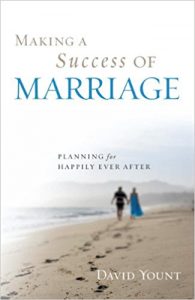Making a Success of Marriage: Planning for Happily Ever After
 “At its very best marriage affords a man and woman the opportunity to create not only offspring but an entirely unique creature called ‘us,’” David Yount writes in Making a Success of Marriage: Planning for Happily Ever After.
“At its very best marriage affords a man and woman the opportunity to create not only offspring but an entirely unique creature called ‘us,’” David Yount writes in Making a Success of Marriage: Planning for Happily Ever After.
Yount presents this book as a “defense of marriage,” convinced that though wedlock fell victim “to a near 50 percent divorce rate” in recent decades, there is nothing wrong with marriage itself “and everything right with it.” What needs fixing “are the expectations that couples bring to it and the strength of their commitment,” he says.
What impressed itself on me was the book’s multidimensional presentation of married life. Without slighting a couple’s personal relationship, Yount situates marriage within a larger context.
Thus, marriage encompasses intimate love, while calling couples to a joint exercise of financial responsibility, constructive interaction with aging parents, friends and others, concern for each other’s health and, among other things, the demanding care of their children. For example:
Health: “Since you are cooking and eating together as a couple, you are responsible for each other’s nutrition,” Yount advises. He urges spouses to “monitor each other’s health,” for “if your spouse is suffering, your marriage can suffer.”
Money: Yount’s chapter on a couple’s home-based financial responsibilities offers more pragmatic, down-to-earth advice than is found in most books on marriage. “Budgeting simply means knowing where your money is going so you can be assured of having enough of it when you need it,” he observes.
Recognizing the toll excessive spending takes, the author writes: “A car (or even two of them) may be necessities, but they don’t have to be expensive or new. You may consider a college education to be a requirement for your children, but an Ivy League campus is not a necessity.”
Marriages today, more than ever, require “courage, clear-sightedness and commitment,” Yount insists. Every marriage “will be tested by circumstances beyond [the couple’s] complete control” — “illness, accident and financial strain.” A healthy marriage survives such tests “by putting hope and trust ahead of anxiety,” says Yount.
With so much in mind, one wonders what a person should look for when considering marriage. Yount writes:
“Your prospective mate will probably also share your religious beliefs, your cultural interests, and your level of education and intelligence. Your prospective mate will also feel the same way as you do about wanting children and caring for aging parents.”
Yount suggests that people contemplating marriage seek “someone who will affirm who you are and what you stand for.” A lasting marriage is “one of shared values,” he says.
And religious faith is invaluable, the author finds. Spouses “need to believe in something beyond” themselves. He says: “Happy couples live longer. So do people with religious beliefs.”
Yount, a Quaker, writes in light of this faith, as well as his pastoral-counseling experience. He has authored 13 books and a syndicated column; his book recalls experiences as a Marriage Encounter leader. Yount’s long-lasting marriage, his second, came after what he calls an “ill-advised” first marriage.
This book adds to the expanding library of literature in “the marriage movement,” fostered by religious leaders of varying faith backgrounds, psychologists, sociologists, TV personalities and other commentators. If these people approach marriage from differing perspectives and bases, what unites them is the conviction that marriage remains a viable institution in which couples can truly and happily succeed.
A unique feature of Yount’s book is its list of 100 brief statements designed to help couples determine whether their expectations of marriage are reasonable, while prompting them to “define what each of them is prepared to invest in their life together, as opposed to what they expect to gain from marriage.”
For example, the list asks readers whether they agree or disagree with statements like these: “Since we love each other, we no longer need to say ‘please’ and ‘thank you.’ … If I am ever unfaithful in the marriage, it will be my partner’s fault. … I can continue to enjoy the freedoms of single life after marriage. … I expect my wedding day to be the peak experience of our lives.”
Yount believes husbands and wives in successful marriages respect their differences, accept apologies, let go of the past, tread softly on each others’ vulnerabilities and leave “the door open to reconciliation after disputes.” He cautions that “wedlock can become a lockout when partners compete with each other, blame each other and insist on being right.”
About the reviewer
David Gibson served for more than 37 years on the Catholic News Service editorial staff.
Disclaimer: Book reviews do not imply and are not to be used as official endorsement by the USCCB of the work or those associated with the work. Book reviews are solely intended as a resource regarding publications that might be of interest to For Your Marriage visitors.




